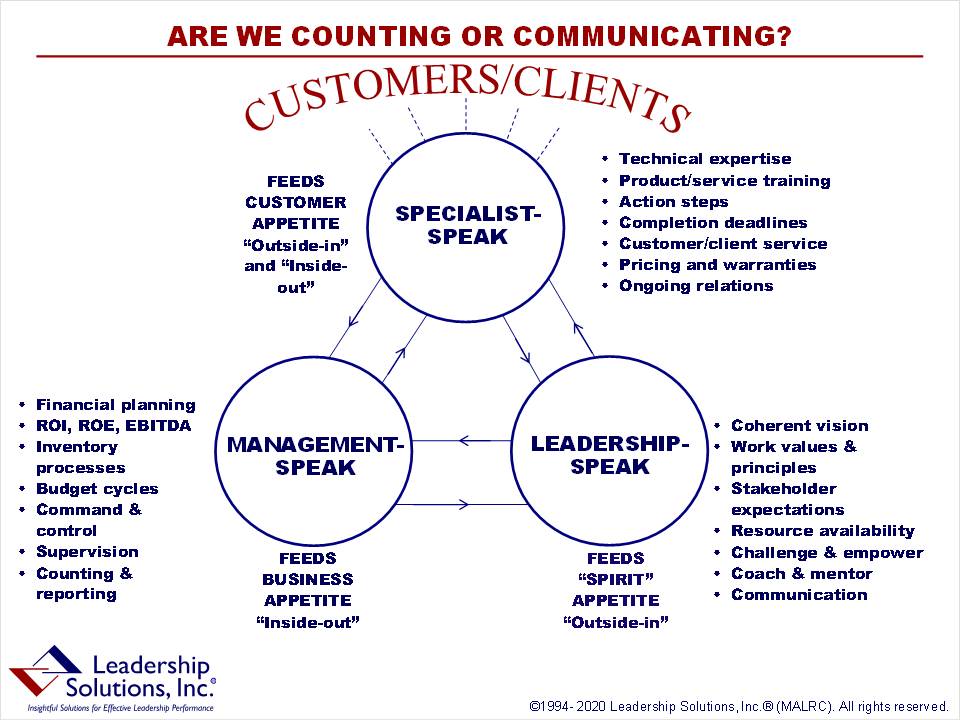By Peter A. Arthur-Smith, Leadership Solutions, Inc®
 |
There are three forms of key “speak” within any organization, as depicted in the adjacent image: Specialist, Management and Leadership “speak.” Understanding each is important, as they have a major influence on your venture’s culture. And we all know that our enterprise’s culture ultimately has a significant impact on its eventual performance.
First, let’s quickly address specialist speak; while it’s not the main focus of this article, it’s still important to understand. This is because “specialist speak” is the messaging that feeds a commercial venture’s customers’ appetite. In the case of non-profits, it’s what donors and beneficiaries wish to hear. With academia, it’s what students, parents and ultimate employers desire to hear. With local and national governments, it’s what voters and citizens want to hear. And, finally, with sporting entities, it’s what their fans expect to hear.
Any of these “customer” groupings are likely to be asking: Does this organization seem to know what it’s talking about? Will its activities really meet our needs? Will it take care of us every step of the way? Will we be treated with fairness and respect? Will its ticket prices provide enough opportunities for our team to win? Specialist speak seeks to provide answers to those questions.
Now, back to discerning between leadership and management speak. The fundamental difference between the two can be summed up by the question: “Are you counting or communicating?” That’s because managers appear to spend so much of their time counting, while their leadership counterparts spend so much more time on communicating.
Management speak feeds your business’s and owner-shareholder appetites. You find managers frequently fixated on questions like: Are we going to make enough money? Will there be sufficient return on our investment? Are our systems and reporting mechanisms going to be robust enough? In fact, managers are highly absorbed with their systems and processes that are primarily fixated on taking care of owner- shareholder interests. Welcome to the “management speak” world.
With non-profits, academia and government, management speak is all about budgetary control. Their managers are preoccupied with filling donor coffers, meeting student quotas and addressing tax revenues, so that their entity can survive. Additionally, they are absorbed with meeting non-profit expenses, handling faculty costs and funding municipal or departmental shortfalls. Such issues appear to dominate management speak and therefore carries forward into their daily cultures. It makes them “inside-out” oriented or obsessed with their own internal machinations contrary to the interests of those they are supposed to serve.
On the other hand, with leadership speak it feeds your venture’s people and alliance appetites. It requires putting together an exciting venture vision with your people’s involvement. It includes articulating organization and workplace guiding principles and values that they can buy into, as well define the expectations of all stakeholders involved. Furthermore, leaders will be open to negotiate the necessary resources available to make their people’s contributions so much more doable.
Leaders, more often than not, are found asking such questions as: How can I challenge and empower my people as much as possible to succeed? Where do they need to be coached and mentored? Do we have sufficient two-way communication to inspire and involve them? Do we maximize our collaborative relationships? Such questions define leaders as people and progress oriented to the degree that all stakeholders – including customers and owners – feel their expectations are being met. “Speak” like this defines leaders as “outside-in” oriented rather than being wrapped up in their own interests. This makes them preoccupied with surpassing outsider’s expectations and then their ventures will attract all reasonable resources necessary to grow and prosper.
During these difficult COVID-19 times, it is very clear that those with a management speak mindset laid off many of their people very quickly; whereas those operating with leadership speak hung on to their people as long as possible. The latter will benefit from their people’s loyalty in so many ways over time.
And so it becomes clear that organizations with a strong management speak culture almost ignore the many benefits of leadership speak. Depending on their marketplace they may eke out a decent profit, particularly if they are efficient at making new acquisitions. Meanwhile, those ventures that are heavily into leadership “speak” without the right balance of management “speak,” may become a little chaotic and not fulfill their optimum potential. Fortunately, most leadership speak cultures recognize the need for a modicum of management speak to rein in any excesses. That’s why many of them are highly successful and fun places to be a part of.
Ultimately, organizations benefit from both leadership and management speak. The trick is knowing when and who to engage in the appropriate speak. Try reading through some of your most recent communications, or reflect on what you’ve shared at recent meetings. Did you utilize more management speak or leadership speak? Did doing so serve your purpose and goal for that particular communication? If not, what changes could you make to better reflect your purpose and intent?
To find out more about your position and pathfind approach, talk with:
